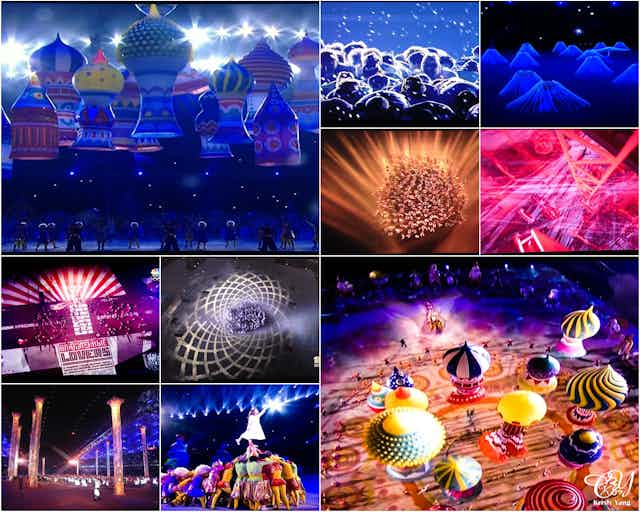The role of an Olympic opening ceremony is twofold – it is a place to show off to the world and it is a place to converse with your own citizens.
So what did the grand opening ceremony to the Sochi Winter Olympics, held on Saturday, impart?
International commentary noted the huge leaps over some of the appalling episodes in the modern history of Russia (such as the Stalinist purges) and has gently or openly mocked the kitsch rendition of the history celebrated.
(The criticism is valid – indeed I think I made it myself when I viewed the opening ceremony for the 2000 Sydney Olympics – but it is also a bit pointless.)
Mixing politics and pleasure
The Olympics is a deeply political space, but it is also one that has a set of powerful rules and rulers, who in tandem with the government of the nation hosting the event work very hard to neutralise this sense of the political.
The long history of vaunting sport as something that transcends politics means it is hard to maintain a critique of the Olympics. In most Games the images of the achievements of the elite youth from so many nations soon replace the half-hearted critiques of political injustice, technical malfunctions and bribery that are so prevalent in the lead-up to the event.
But before this shift to sporting carnival and medal count takes place, what did happen in the kick-off ceremony?

First, what was the opening ceremony story for Russian citizens? To start, the Olympics are in Sochi. For many outsiders locating this event in a place we had never heard of seemed perverse.
It was of course a deeply political choice for Russia. Sochi is not far away from where the war against Chechen rebels was fought. To stage a national event in this place was not neutral.
And then within this geographic space the smaller event of the opening ceremony (re)produced a dominant national history for locals and the wider Russian public. A beautiful story of a unified Russian past was played out in the stadium, erasing a violent near past.
For most international viewers the minutiae of this national story passed us by. We simply depended on the crib notes provided for the television commentators who explained what was happening.
For locals there was most likely a more intimate relationship with each glorious historical tableaux as it appeared and was quickly replaced by another mesmerising scene. In this dreamlike set of visions, citizens were invited to fall in with the spectacular history that was being presented for them.
If you remember in the Sydney Olympics we also had a young blonde girl who flew around the arena and led viewers through a history devoid of conflict.
We were invited to dispense with the banal or political and move into a dreamlike world of the past. In both Sydney and Sochi the use of the innocent young guide makes it harder to resist the nationalistic patchwork being presented for our consumption.
A rude (re)awakening
Though the spectacle of the opening ceremony may have Alice in Wonderland-like abilities to transport us elsewhere, the Olympics still exist in a real world. In many countries the lead up to the Sochi Olympics was focused on the draconian laws against gay men and lesbians in Russia.
For many non-Russians this was the context in which the ceremony was watched. We were alert to any hypocrisy we saw in the ceremony. As a signer of quite a few petitions seeking to stop state violence against gay and lesbian Russians, I was not immune to this tendency.
And the Olympics are political, so why not use this time to think about social (in)justice? Why not notice incongruity between the role of President Putin in some deeply unjust laws and actions and his role opening the Games?

Unfortunately, it does seem to me that this alertness has at times morphed into a form of racism. The #sochiproblems hashtag alongside a long history of animosity to the Russian state has made it easy for commenters to move from the political to the cruel.
Iconic, ironic … or something more?
The Sochi opening ceremony seemed to me to be no more kitsch than any other I have watched. As Australians, many of us thought the scene in the 2000 Olympics with backyards and lawnmowers was ironic, but we don’t seem to presume the same level of self-awareness in the Russians.
There seems to be an undercurrent of a cosmopolitan elite visiting country cousins in their backwood’s village in much of the response to the opening ceremony.
The Olympics is sold to us an event that brings the world together. It is of course a multi-billion dollar extravaganza that is used by governments around the globe to produce national and international propaganda. We all know this.
Yet, if we are going to watch the Winter Games, there must be a place from where we can view these 16 days – kicked off with the predictable whizbang piece of high nationalism – from a slightly more reflexive place.
There must be a way of using these Games to put a spotlight on injustice in Russia, while also remembering how many Australians disliked the spotlight when it was shone on us in Sydney.
There must also be the will to make links between the political issues that are being highlighted in Sochi and those in our own backyard.
I imagine that many of the door handles in the detention centre on Manus Island fall off quite regularly. And as the Mardi Gras is just around the corner the issue of violence against Australian gay men and lesbians once again might need some consideration.

